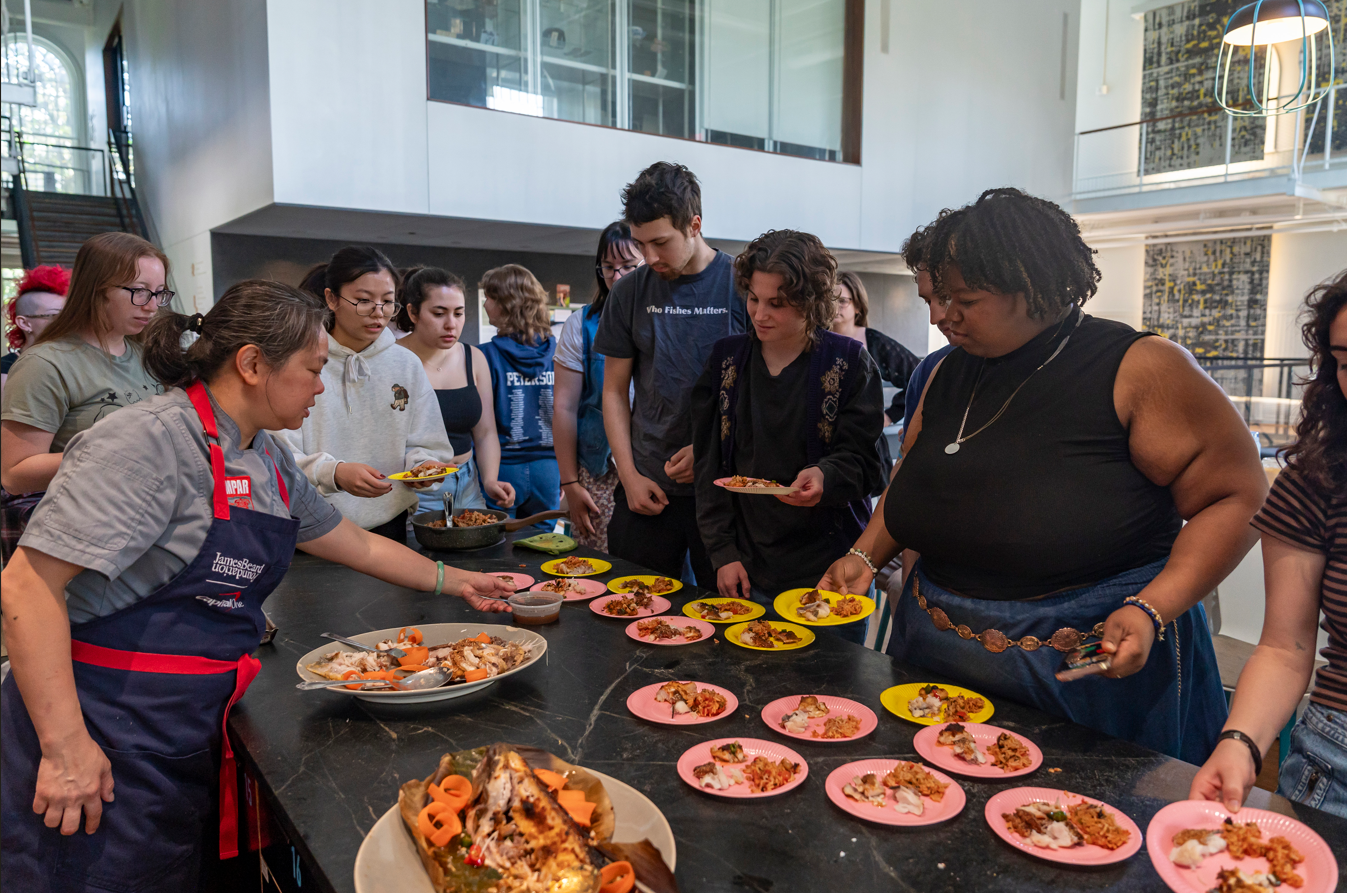Circled around the countertop of the Haverford VCAM kitchen, students watched on as two chefs prepared the same kind of fish in their own unique way. Ange Branca, who grew up in Malaysia and now lives in Philadelphia, cooked her fish in a banana leaf, garnishing the dish with peppers and carrots. Valerie Erwin, also a Philadelphia chef, coated the scales in a cornmeal mixture, leaving the cooked fish with a crispy outer layer.
Branca and Erwin were invited to the college as part of the class Fish & Community: A Local Praxis, taught by Talia Young. Young is a Visiting Assistant Professor of Environmental Studies and the director of Philadelphia area community seafood program Fishadelphia.
Professor Young’s course delves into a wide variety of theories, questions, and discussion points about fish and the communities surrounding them. She says, “We learn about the environmental concerns about fishing and seafood harvesting, both from a sort of narrative and an academic standpoint. And then we think about models for managing common resources. So understanding, how do we equitably and fairly, and effectively manage a resource into which everyone has access, and what does that look like? So last week we talked about neoliberal approaches to fisheries management, and there are pluses and minuses. This week, we talked about alternative seafood supply chains and direct marketing. Next week we’re talking about eating seafood. Next week I have some fishermen coming for a panel, and the week after that I have some chefs coming in to cook.”
The class brings in local members of the community to talk about their expertise and experiences in seafood and fishing. Professor Young, in the past, has also done trips to oyster farms and fish docks around the area.

The course was first created in 2020, in the midst of the pandemic. “I wanted to start a fish stand distribution point on campus and in Ardmore.” Young recalls. “The whole class worked together to start this fish stand, and when we did, it was the first time we’de seen each other in person ever in our lives. It was also the first time we’de seen people in person in months, you know? And it was so amazing to be in person, wearing masks outside, shivering in our coats, but it was so awesome. And so for the first two years, we built and supported the fish stands.”
The course has taken a different turn from its initial creation in 2020. “By the third year, they [fish stands] were running pretty well and we didn’t need a course to do that anymore,” says Professor Young. “So I modified the course such that everybody got an individual internship at a fish or water-based organization. That’s been the structure.”
Some of these internships involve Fishadelphia. “Students have been involved in Fishadelphia in a lot of different ways since it started. At least some students every year choose internships at Fishadelphia, so they’ve been involved with the fish packing or the fish stands, or the youth program,” Young said.
Willa Hollinger, a sophomore at Bryn Mawr College, is currently in the course. “It meets on Tuesdays and Thursdays. Every Tuesday, we discuss the readings we did and the blog posts we wrote. At the start of the course, we talked about the importance of community engagement. The whole course is about how important fisheries can be to the communities around them and how fresh protein can be provided to the community. Since then, we’ve had a different lens for each week.”
The course has a wide range of topics and theoretical lenses, including discussion around sustainability, harvesting, Indigeneity, climate change, and supply chains. Hollinger discussed how Young brings guests into the class. “We had a panel today. Dr. Young invited four or five different seafood harvesters, fishermen, and oyster farmers. That was cool. Next week we’re doing a cooking demonstration at the VCAM kitchen. I’m excited.”

Willa is interning with Don’t Cage Our Oceans, an organization a part of the North American Marine Alliance (NAMA); an experience which she has monikered her “fishternship”. Willa says, “I’m more interested in communications. It’s been interesting to attend their legislative strategy meetings. The organization is against industrial fish culture. They fight the corporate takeover of the ocean commons and distribute opportunities to small fisheries.”
Willa described that a lot of her work with Don’t Cage Our Oceans is politically driven and legislative, allowing her to get a different perspective that ties in topics from the course. “The politics of environmental law is crucial at this time, more than ever before. It’s been really interesting to observe their strategy.”
“They’ve had me do tasks like compiling disasters that have happened in industrial fish farms. They had me collaborate on a fact sheet for this bill that they want to reintroduce, called ‘Keep Thin Fish Free’, and it would ban the introduction of new industrial aquaculture areas in federally controlled waters. It’s gonna be introduced soon and passed out in the halls of Congress. It felt really special. I’m glad that I chose to do an internship that had me developing skills that I’ve never had to have before.”
The course has helped Willa develop a strong interest in “foodways and sustainable foodways.” She notes that “fishing, I think, as a practice, is as important as farming is on land. I can see myself going into an environmental management position in the fishing industry. I was drawn to the goal of NAMA; it feels like something I want to do in my career.”
For those that are interested in learning more about fisheries and sustainable foodways, Professor Young is offering ‘Introduction to Fisheries Science’ in the Fall 2025 semester.
